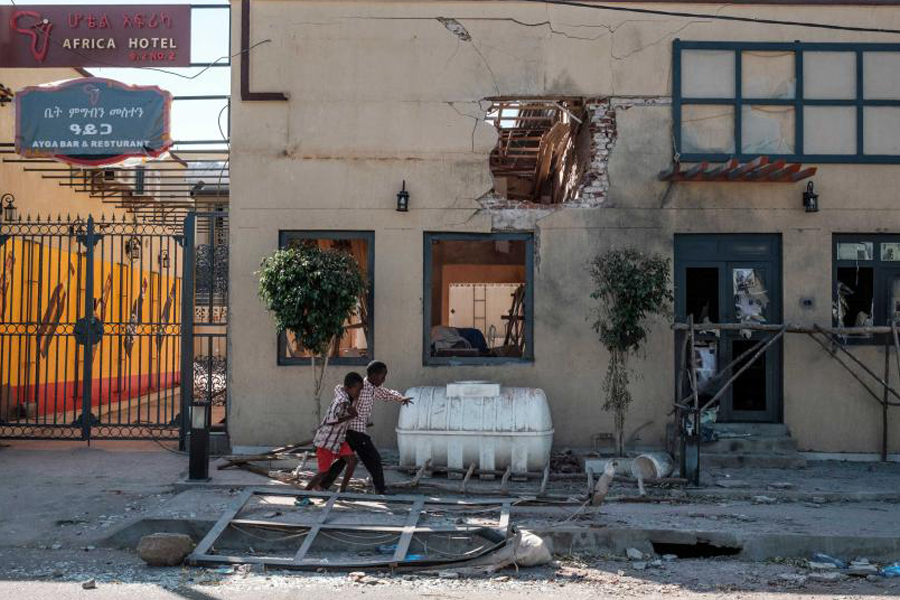
Commentaries | May 28,2022
Feb 16 , 2019
By Tibebu Bekele
Recently, I had to go to a kebele office to obtain a permit to shore up a fence. What I noticed was a clear change in the way the service-needing public is treated.
There is much more civility and friendliness on the part of the civil servants toward the general public, making people feel welcome. At least for now, gone are the arrogant and dismissive demeanour that used to be commonplace in such places of service delivery.
Loud, condescending public servants that feel like they are doing us a favour by working there and a quietly supplicant citizen that is willing to do anything to get the service they desperately need is no longer the norm. Citizens are as emboldened in asserting their rights as the public servants are relatively more likely to heed demands.
This may be a result of the tone set from the top. Prime Minster Abiy Ahmed (PhD) has been consistent in showing humility and civility in all his public addresses. He has emphasised the public’s right to get good service from civil servants. This is an example he has set both in his words and actions and seems to be bearing fruit as far as form is concerned.
However, this does not extend to substance. Even though the public servants in my kebele were more civil than before, they were no more efficient. For all their new-found humility and friendliness, it still took me over a week to get the permit.
This was not because there was anything complicated about my case but because the operation is still inefficient. A request that should not have taken more than a couple of hours start to finish, took more than a week because the civil servants have not changed anything beyond the superficial.
Two days were wasted because the department head that had to sign off on the form did not show up to work, and another day was wasted because they were having all-staff meetings. The rest was just the usual lazy excuses. These are all things we have been dealing with for years.
There have been several attempts to bring more efficiency to the civil service. From BPR to Kaizen, from Balanced Score Card to Development Army, different campaigns have been tried and failed. But we need to recognise that unless and until the government figures out how to give efficient and equitable service delivery, no reform or revolution will succeed in this country.
Charles Polidano in a 2001 paper titled, “Why Civil Service Reforms Fail,” says “most reforms in government fail. They fail not because, once implemented, they yield unsatisfactory outcomes but because they never get past the implementation stage at all.” As they say, “you campaign in poetry but you govern in prose.”
Getting down to the business of the people on a daily basis is not as sexy as making flowery speeches. Rolling one’s sleeves up and working at least eight hours a day in some poorly lit, shabbily furnished government office does not get one noticed. However, that is what will ultimately deliver the promises of this reform many are betting their lives on.
There is no doubt that the current Prime Minister of the country, Abiy Ahmed (PhD), and the team of reformers he leads enjoy widespread and popular support. It is critical that this support base realises that waving flags, organising rallies and wearing t-shirts with his pictures is not enough to help him achieve his agenda.
There is a reason and a place to do all these things. They are not unimportant, but the more critical support the PM needs is in the mundane activities of everyday responsibilities as citizens and civil servants. That is what will guarantee success, not empty rhetoric.
It is crucial to remember that most revolutions and reforms do not end well. In fact, history shows more failures than successes for the simple fact that delivering on the promises of reform agendas require sustained effort and disciplined sacrifices. Few are willing or able to do that. But that is what it takes, and there is no shortcut.
The call for change and the sacrifices paid to bring it about were not instigated by ideological pursuits. It was kindled by the increasingly impossible living conditions the youth were facing in their daily lives and the utter failure of government institutions to deliver basic services in an equitable manner.
After all, even the Arab Spring revolution was started by one street vendor, Mohammed Bouazizi, who set himself on fire because he was too frustrated and angry by the acts of government regulators that made life impossible.
The first order of business, therefore, should be to lower the tension by delivering good basic services. There are a lot of complex issues that will take time to implement because they require high-level policy changes and a significant budget.
But most issues that make citizens’ lives difficult are neither complex nor expensive. They can be addressed right now if there is the will and commitment. If the supporters of the reform movement and its charismatic leader put down the flags and banners for just a little while and roll up their sleeves and perform their daily responsibilities with revolutionary zeal, they will surprise themselves by how much change they can affect.
If every civil servant that supports the reform was to report to work on time and worked to their full potential, there would be change. The revolutionaries of the 21st century are not the gun-toting guerrilla fighters anymore but the disciplined civil servants and public officials who put in an effort every day to serve citizens with maximum efficiency. That is what will make or break the reform agenda.
PUBLISHED ON
Feb 16,2019 [ VOL
19 , NO
981]


Commentaries | May 28,2022

My Opinion | Jul 03,2021

Commentaries | Aug 21,2021

Radar | Jan 29,2022

Commentaries | Dec 19,2020

Viewpoints | Mar 18,2023

Fortune News | Jul 28,2024

Viewpoints | Mar 30,2019

Editorial | May 23,2020

My Opinion | Jul 20,2024

My Opinion | 132045 Views | Aug 14,2021

My Opinion | 128441 Views | Aug 21,2021

My Opinion | 126368 Views | Sep 10,2021

My Opinion | 123991 Views | Aug 07,2021





Dec 22 , 2024 . By TIZITA SHEWAFERAW
Charged with transforming colossal state-owned enterprises into modern and competitiv...

Aug 18 , 2024 . By AKSAH ITALO
Although predictable Yonas Zerihun's job in the ride-hailing service is not immune to...

Jul 28 , 2024 . By TIZITA SHEWAFERAW
Unhabitual, perhaps too many, Samuel Gebreyohannes, 38, used to occasionally enjoy a couple of beers at breakfast. However, he recently swit...

Jul 13 , 2024 . By AKSAH ITALO
Investors who rely on tractors, trucks, and field vehicles for commuting, transporting commodities, and f...

Jul 12 , 2025
Political leaders and their policy advisors often promise great leaps forward, yet th...

Jul 5 , 2025
Six years ago, Ethiopia was the darling of international liberal commentators. A year...

Jun 28 , 2025
Meseret Damtie, the assertive auditor general, has never been shy about naming names...

Jun 21 , 2025
A well-worn adage says, “Budget is not destiny, but it is direction.” Examining t...

Jul 13 , 2025 . By YITBAREK GETACHEW
The Addis Abeba City Revenue Bureau has introduced a new directive set to reshape how...

Jul 13 , 2025 . By BEZAWIT HULUAGER
Addis Abeba has approved a record 350 billion Br budget for the 2025/26 fiscal year,...

Jul 13 , 2025 . By RUTH BERHANU
The Addis Abeba Revenue Bureau has scrapped a value-added tax (VAT) on unprocessed ve...

Jul 13 , 2025 . By NAHOM AYELE
Federal lawmakers have finally brought closure to a protracted and contentious tax de...